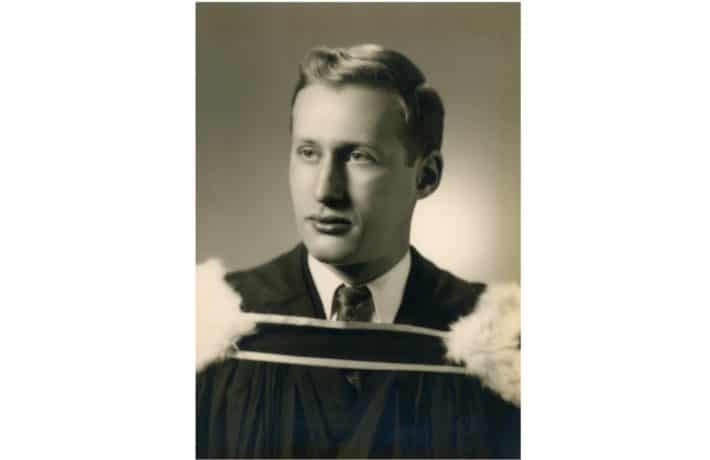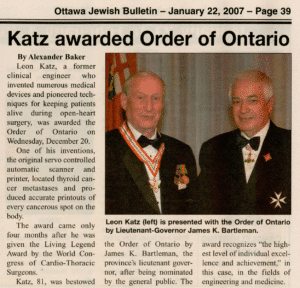
December 20, 1924 – January 9, 2015
Leon Katz was born and raised in Montreal, Que., the second of four children to Romanian immigrants Regina and Harry Katz. At 19, Katz volunteered for the Canadian Army, served as an officer in the British Army, and covertly assisted the Jewish Brigade in rescuing Jews from the Holocaust. Back in Canada, he vowed to dedicate himself to saving lives.
Katz was accepted to McGill University in Montreal during a period when quotas limited the number of Jews admitted to Canadian universities. He studied electrical engineering and graduated in 1950, then advanced to biomedical engineering and ultimately pioneered an astonishing range of innovations across numerous fields of medicine.
In the early 1950s, Katz worked as a biomedical engineer at the Montreal Neurological Institute with renowned neurosurgeon Dr. Wilder Penfield. Katz devised instruments that facilitated Penfield’s dramatic discoveries of the human brain and related diseases. Katz’s expertise and ingenuity greatly improved patient care and safety. From 1955 to 1965, he was the director of biomedical engineering and the cardiac catheter laboratories at the Institut de Cardiologie de Montréal, where he invented and developed a range of medical apparatus, including Canada’s first fetal heart monitor. Katz was instrumental in devising innovative infant incubators, as well as a high-speed contrast injector for angiography, and a whole-bolus injector for radioactive iodine, for cancer cells uptake in the thyroid.
Among his most notable accomplishments, Katz designed and operated Canada’s first heart-lung bypass machine, later used in thousands of subsequent open-heart surgeries in Canada. Previously, many had died who could not survive without surgery, and could not survive surgery without Katz’s bypass pump.
In 1965, Katz founded Medco Instruments to manufacture medical devices. He stayed on as a consultant after selling the business to a U.S. medical products firm, and continued to design and build devices, including an infant apnea monitor, the Air Shields infant incubator, external cardiac pacemakers, and a DC defibrillator.
Katz left the hospital milieu in the 1970s and transitioned into regulatory legislative work as the first chief of the Diagnostic Devices Division, and Evaluation and Standards Division, in the Bureau of Medical Devices, Health and Welfare Canada. Another outstanding contribution, affecting millions worldwide, was the discovery and correction of the backflow hazard from evacuated blood collection tubes used to gather blood samples. While at the bureau, Katz would investigate and correct legislation with respect to more than 1,000 problems with devices, from tongue depressors to inverted tubes, MRI scanners to Stryker frames and cardiac pacemakers, pregnancy test kits to condoms, and child-safe medicine bottles.

Images-
Featured Photo: Leon Katz, McGill University, 1950, Courtesy of the Katz family
Clipping: Baker, A. (2007, January 22). Katz awarded Order of Ontario. Ottawa Jewish Bulletin, p. 39.